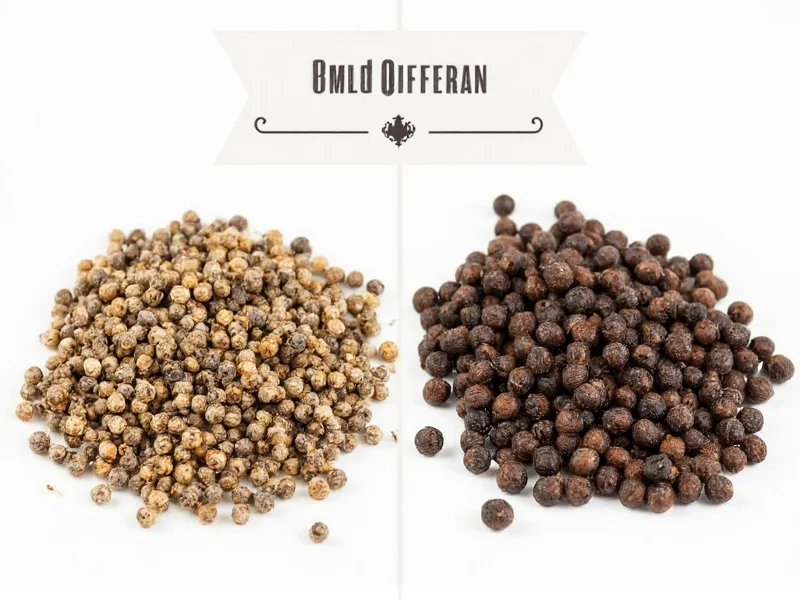Understanding the distinct flavor profiles of these common kitchen staples can transform your cooking. Both originate from the same Piper nigrum plant, yet their processing creates markedly different sensory experiences that chefs leverage for specific culinary applications.
The Science Behind Pepper Flavor Development
Peppercorns develop their characteristic heat from piperine, a chemical compound present in both varieties. However, the concentration and accompanying flavor compounds vary significantly due to processing:
| Characteristic | Black Pepper | White Pepper |
|---|---|---|
| Processing Method | Unripe berries sun-dried with outer layer intact | Ripe berries soaked to remove outer layer, then dried |
| Primary Flavor Notes | Sharp, pungent, complex with citrus/floral hints | Earthy, musty, subtle heat with fermented notes |
| Heat Intensity | Higher (more piperine retained) | Moderate (some piperine lost during processing) |
| Volatile Oils | Preserved (40+ compounds) | Reduced (outer layer contains most aromatic oils) |
| Best Culinary Uses | Meats, robust dishes, finishing applications | Cream sauces, light-colored dishes, subtle seasoning |
Black Pepper: Complexity in Every Grain
When unripe green peppercorns are harvested and sun-dried, the outer layer (pericarp) undergoes enzymatic changes that develop black pepper's signature complexity. This process preserves volatile oils like limonene and pinene that contribute citrus and pine notes alongside the characteristic heat. The resulting flavor profile features:
- An initial sharp, almost floral aroma
- A pronounced pungent heat that builds gradually
- Subtle undertones of wood and citrus
- A lingering finish that enhances other ingredients
Chefs often prefer freshly cracked black pepper for finishing dishes where its visual speckles add aesthetic appeal while delivering maximum flavor impact. The difference between freshly ground and pre-ground black pepper represents one of the most dramatic freshness contrasts among spices.
White Pepper: The Subtle Seasoning Specialist
White pepper begins as fully ripe red peppercorns. After harvesting, they're soaked in water for about a week, allowing the outer layer to ferment and separate from the seed. This fermentation process creates white pepper's distinctive earthy, slightly musty character. The resulting flavor profile includes:
- A cleaner, more direct heat sensation
- Earthy, sometimes barnyard-like notes from fermentation
- Less aromatic complexity but greater subtlety
- A smoother finish without black pepper's sharp bite
This processing method removes many of the volatile oils responsible for black pepper's complexity, leaving primarily the seed's piperine content. The fermentation step introduces additional flavor compounds that give white pepper its unique character, making it particularly valuable in applications where visual appearance matters.
Culinary Applications: When to Choose Which Pepper
Professional chefs select between these peppers based on both flavor goals and visual considerations:
Choose black pepper when:
- Creating robust dishes like steak au poivre or black pepper crab
- Adding visible speckles to finished dishes for aesthetic appeal
- Seeking complex heat that develops gradually
- Preparing dishes where strong pepper flavor is desired
Choose white pepper when:
- Preparing light-colored sauces like béchamel or velouté
- Seasoning delicate fish or chicken dishes
- Creating traditional European dishes like coq au vin
- Seeking subtle background heat without visual distraction
Many professional kitchens maintain both varieties because they serve distinct purposes. Understanding the taste difference between white and black pepper helps explain why certain recipes specify one variety over the other. The subtle flavor nuances become particularly important in refined cuisine where seasoning balance is critical.
Common Misconceptions About Pepper Varieties
Several myths persist about these common spices:
- Myth: White pepper is "stronger" than black pepper
Reality: Black pepper typically contains more piperine and delivers more complex heat - Myth: White pepper is just old black pepper
Reality: They come from the same plant but undergo completely different processing - Myth: The heat difference comes from ripeness alone
Reality: Processing method (particularly retention or removal of the outer layer) creates the primary flavor distinction
Maximizing Flavor: Storage and Usage Tips
To preserve the distinctive flavors of both pepper varieties:
- Store in airtight containers away from light and heat
- Grind black pepper just before use to capture volatile oils
- White pepper benefits from toasting lightly before grinding to enhance its subtle flavors
- Use coarse grind for meat crusts, fine grind for sauces
- Consider pepper age—freshly harvested peppercorns deliver more vibrant flavor
Understanding what is the taste difference between white and black pepper goes beyond simple heat levels—it's about how these spices interact with other ingredients and contribute to overall dish harmony. The distinctive flavor characteristics of each variety make them indispensable tools in a well-equipped kitchen.
Frequently Asked Questions
Can I substitute white pepper for black pepper in recipes?
Yes, but with flavor considerations. White pepper provides milder, earthier heat without black pepper's floral notes. Substitute in a 1:1 ratio for light-colored dishes where black specks would be undesirable, but expect a different flavor profile in robust dishes where black pepper's complexity is essential.
Why does white pepper sometimes taste musty?
The musty flavor comes from the fermentation process used to remove the outer layer of ripe peppercorns. Higher quality white pepper undergoes controlled fermentation that minimizes undesirable mustiness while developing characteristic earthy notes. Proper storage also prevents excessive mustiness from developing over time.
Which pepper has more health benefits?
Black pepper generally contains more piperine and volatile compounds due to its processing method, potentially offering greater antioxidant benefits. However, both varieties provide similar digestive benefits. The difference in health properties between white and black pepper is relatively minor compared to their flavor distinctions.
Does the origin of pepper affect the taste difference between varieties?
Yes, terroir significantly impacts flavor. Vietnamese black pepper tends to be more floral, while Malabar Indian pepper offers woodier notes. Similarly, white pepper from different regions varies in earthiness and fermentation character. However, the fundamental taste difference between white and black pepper processing remains consistent across origins.











 浙公网安备
33010002000092号
浙公网安备
33010002000092号 浙B2-20120091-4
浙B2-20120091-4